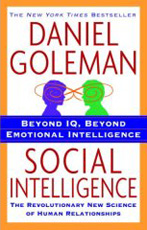"It was during the last years of apartheid in South Africa, the system of complete segregation between the ruling Dutch-descended Afrikaaners and the 'colored' groups. Thirty people had been meeting clandestinely for four days. Half were white business executives, half black community organizers. The group was being trained to conduct leadership seminars together, so they could help build governance skills within the black community.
"On the last day of the program they sat riveted to a television set while President F. W. de Klerk gave a now-famous speech that heralded the coming end of apartheid. De Klerk legalized a long list of previously banned organizations and ordered the release of many political prisoners.
"Anne Loersebe, one of the black community leaders there, was beaming: as each organization was named, she pictured the face of someone she knew who could now come out of hiding.
"After the speech the group went through an ending ritual in which each person had a chance to offer parting words. Most simply said how meaningful the training had been, and how glad they were to have been there.
"But the fifth person to speak, a tall, emotionally reserved Afrikaaner, stood and looked directly at Anne. 'I want you to know,' he told her, 'that I was raised to think you were an animal.' And with that, he broke into tears.
"Us-Them restates I-It in the plural: the underlying dynamics are one and the same. As Walter Kaufmann, the English translator of Martin Buber, put it, with the words 'Us-Them,' 'the world is divided in two: the children of light and the children of darkness, the sheep and the goats, the elect and the damned.'
"The relationship between one of Us and one of Them by definition lacks empathy, let alone attunement. Should one of Them presume to speak to one of Us, the voice would not be heard as fully or openly as would that of one of Us — if at all.
"The gulf that divides Us from Them builds with the silencing of empathy. And across that gulf we are free to project onto Them whatever, we like. As Kaufmann adds, 'Righteousness, intelligence, integrity, humanity and victory are the prerogatives of Us, while wickedness, stupidity, hypocrisy, and ultimate defeat belong to Them.'
"When we relate to someone as one of Them, we close off our altruistic impulses. Take, for example, a series of experiments in which volunteers were asked if they would be willing to get an electrical shock in place of someone else. The catch: they could not see the potential victim but simply heard a description of him or her. The more unlike themselves the other person was described as being — the more one of Them — the more unwilling they were to come to their rescue.
" 'Hatred,' said Elie Wiesel, the Nobel Peace Prize winner and Holocaust survivor, 'is a cancer that is passed from one person to another, one people to another.' Human history chronicles an endless stream of horrors perpetrated by one group that turns viciously against another — even when that other group has far more similarities to than differences from themselves. Northern Irish Protestants and Catholics, like Serbs and Croatians, have battled over the years, though genetically they are each other's closest biological brothers and sisters.
"We confront the challenges of living in a global civilization with a brain that primarily attaches us to our home tribe. As a psychiatrist who grew up amid the ethnic turmoil of Cyprus put it, groups that are so much alike move from Us to Them via the 'narcissism of minor differences,' seizing on small features that set the groups apart while ignoring their vast human similarities. Once the others are set at a psychological distance, they can become a target for hostility.
"This process is a corruption of a normal cognitive function: categorization. The human mind depends on categories to give order and meaning to the world around us. By assuming that the next entity we encounter in a given category has the same main features as the last, we navigate our way through an ever-changing environment.
"But once a negative bias begins, our lenses become clouded. We tend to seize on whatever seems to confirm the bias and ignore what does not. Prejudice, in this sense, is a hypothesis desperately trying to prove itself to us. And so when we encounter someone to whom the prejudice might apply, the bias skews our perception, making it impossible to test whether the stereotype actually fits. Openly hostile stereotypes about a group — to the extent they rest on untested assumptions — are mental categories gone awry.
"A vague sense of anxiety, a tinge of fear, or mere uneasiness at not knowing the cultural signals of Them can be enough to start the skewing of a cognitive category. The mind builds its 'evidence' against the other with each additional disquiet, each unflattering media depiction, each feeling of having been treated wrongly. As these incidents build, apprehension becomes antipathy, and antipathy morphs into antagonism.
"Outright anger primes prejudice even in those whose biases are slight. Like a match on tinder, antagonism catalyzes the switch from Us and Them (the mere perception of difference) to Us versus Them, active hostility.
"Anger and fear, both amygdala-driven, amplify the destructiveness of a budding bias. When flooded by these strong emotions, the prefrontal area becomes incapacitated, as the low road hijacks the high. This sabotages the ability to think clearly, thereby foiling a corrective answer to that essential question, does he really have all the bad traits I ascribe to Them? And if a damning view of Them has already been accepted, even in the absence of anger or fear that question is no longer asked."
